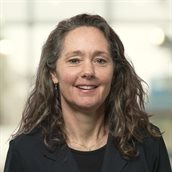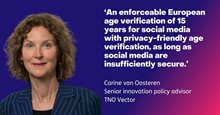Minister Rob Jetten established the independent Energy System 2050 Expert Team in 2022. This team was given the task of coming forward with building blocks – in the form of an ‘outlook’ – for the National Energy System Plan 2050. A broad-based group of independent experts from different fields set to work, led by chairman Bernard ter Haar.
The outlook resulted in the report ‘Energie door Perspectief: Rechtvaardig, Robuust en Duurzaam naar 2050’ (Energy perspective: an equitable, robust, and sustainable path towards 2050). In addition to technical aspects, the advisory report explicitly focuses on the social embedding of energy policy in the Netherlands.
Report 'Energy perspective: an equitable, robust and sustainable path towards 2050'
Interdisciplinary energy system expert team
Maarten Hajer, professor of Urban Futures at Utrecht University: ‘The energy system expert team was put together more broadly than is usually the case for an assignment such as this. Behavioural scientists and spatial planners are also part of the team.’
The Energy System 2050 Expert Team also adopted an unusual approach Whereas most energy advice takes the current technical status as its starting point, the expert team actually started from the perspective of 2050. Hajer: ‘Through backcasting we set out our arguments on what needs to be done over the coming decades to achieve the desired end goal. We therefore reasoned from a future perspective rather than being concerned with making current energy policy in the Netherlands more sustainable. Such a perspective creates space.’
The social aspects of the energy transition and Dutch energy policy played a major role. Hajer explains: ‘Besides backcasting, we also looked at the matter from a broader perspective than most advisory groups. In addition to reflecting on what is technically possible and points for development, we also considered social embedding. In particular, we thought about the role of citizens and how the transition can take place equitably.’
The Energy System 2050 Expert Team involved citizens in its examination of the situation. ‘It’s been clear for years that we need to get to work on climate policy; the energy transition is an urgent matter. Now is the time for implementation. It was immediately obvious to us that involving citizens is very important. We therefore organised a Residents’ Council. This gave us an insight into what matters to people when it comes to making the energy transition a reality.’
The process
The Energy System 2050 Expert Team faced the challenge of delivering the final report within a year. Annelies Huygen, professor of energy market regulation at Utrecht University and principal consultant at TNO Vector: ‘We knew it would be quite a job to get the final report ready by the end of March 2023, but we managed it. A working group made up of colleagues from TNO and the Netherlands Enterprise Agency (RVO) played a very important role. TNO and RVO provided a great deal of support and did a lot of work on the content.’
‘The backcasting approach possibly also contributed to the smooth process. After all, it’s much more fun, creative, and freeing to look at a challenge that way. On the other hand, this unique approach also presents new challenges. Underpinning it with numbers is not always easy.’
Nienke Maas, senior consultant at TNO Vector, was also a member of the working group: ‘It was an interesting and educational year. As a working group, we contributed knowledge, structured information, monitored consistency, and collaborated on the texts. We also organised the round tables and the Open Forum. In this way, we leveraged existing expertise on Dutch energy policy. We were also able to transfer our experiences well to the recently launched Scientific Climate Council.’
Energy policy in the Netherlands
Hajer also talks about the approach of the Energy System 2050 Expert Team. ‘We examined various aspects of energy policy in the Netherlands, such as industry and the built environment. What we didn’t do was precisely determine by how many megatonnes each sector needs to reduce its greenhouse gas emissions. In a climate-neutral society, net emissions are zero, after all.’
‘In the energy advisory report we describe the development pathways of the key components of the energy system, for example the supply of and demand for electricity and hydrogen. But also the possibilities resulting from local energy systems and the use of new carbon chains in industry.’
Key recommendations from the Energy System 2050 Expert Team
What were the key recommendations made by the Energy System Expert Team? The Netherlands is currently far from climate-neutral and faces major challenges to achieve that goal by 2050. Maarten Hajer: ‘The target is ambitious, but achievable. For the energy transition, clear intermediate goals are needed.’
‘If we want to be climate-neutral by 2050, that means achieving a carbon-neutral energy system as early as possible, by between 2040 and 2045. As an intermediate step, we will need to eliminate our net CO2 emissions from electricity generation from 2035. This can all be done, provided we have a clear vision and are not afraid of breaking taboos.’
The three key recommendations from the Energy System 2050 Expert Team:
- Electrification: electricity as main component of energy consumption
Aim for maximum electrification. Power grid capacity is a major challenge when it comes to modernising the energy system. We also need to take into account the current and future shortages of people, resources, space, and materials. The energy transition will become easier if we not only improve supply, but also reduce the overall energy demand. Hajer: ‘We now expect a split of 70% renewable electricity, 10-15% hydrogen, and 10-15% heat and biomass. We’ve also taken some controversial positions. For instance, we think gaps in wind and solar power generation are better filled by coal-fired power plants than by nuclear power. Why? Nuclear plants run at lower capacity when there is a large supply of wind and solar energy. That makes nuclear power expensive.’
- The built environment should be energy-neutral or even energy-positive by 2050
For the built environment to become energy-neutral or even energy-positive by 2050, the total energy demand of a district must be as low as possible. This is a prerequisite for integrated local energy systems. Annelies Huygen explains: ‘From the perspective of equity, it is important to prioritise improving poorly insulated homes. The energy transition will accelerate if we combine Dutch energy policy with measures targeting social and societal improvement.’
- Circularity as a response to scarcity
The future scarcity of carbon and other materials within industry calls for circularity. This requires targeted policies.
Flexible regulation creates scope for innovation
Annelies Huygen also discusses the frameworks set by the Energy System 2050 Expert Team: ‘A key issue is regulatory adjustment, not only to make industry more sustainable, but also the built environment. One example are possibilities for citizens to store electricity and heat and exchange them with each other. This is necessary to achieve sustainable local energy systems. But right now, this is not possible.’
‘The danger is that in the new Energy and Heat Act everything will be described in great detail once again. Detailed rules do not allow scope for innovation and they assume the current situation will apply.’
Maarten Hajer adds: ‘We firmly believe that the government should make simple regulations for citizens and SMEs. That’s how you help society and the economy to make great strides and choose the optimal solution locally.’
The vision: a day in 2050
So what will a day in 2050 look like?
It’s 7 a.m. and I step into the shower. Our shower is set to run for five minutes at a time. The children don’t know any different. Today, I’m going to the shared office nearby.
I fill the dishwasher and washing machine and a smart system turns on the washing machine when the wind is blowing or the sun is shining and energy is therefore cheapest.
At the office I get a message asking if I want to go to a conference in Rome. Competition on the high-speed rail network means that prices are a lot more attractive than before.
The train is also a nice place to work and there are great views along the way. What a difference from the stress you used to have when catching a plane!
On the way home I pick up the drill at a neighbour’s house. It’s nice that we can share stuff and don’t have to buy everything ourselves. It saves a lot of money and space at home and is a lot better for the planet. The stuff we do have is also used much more often now. If something breaks, it’s very easy to get it repaired thanks to EU standards on repair and reuse.
Are you interested in the recommendations of the Energy System 2050 Expert Team?
Would you like to learn more about what they mean for your organisation for example? Contact our experts Annelies or Nienke.



